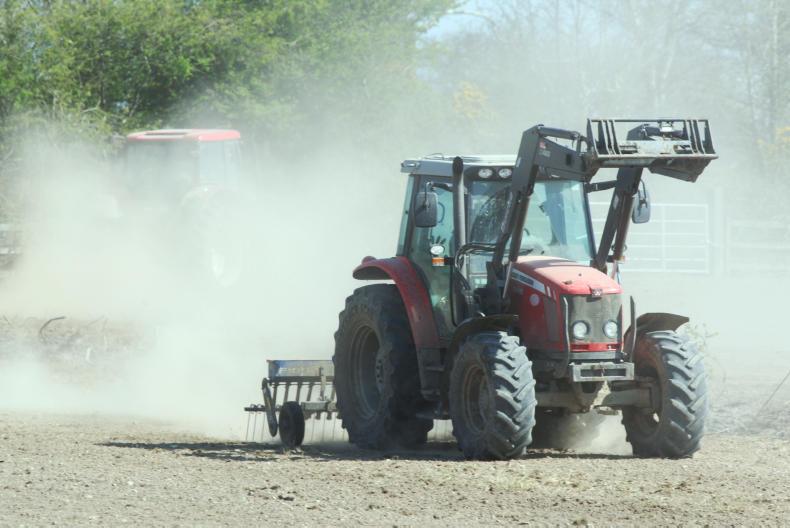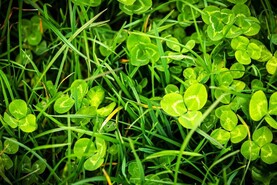Nitrogen: Most of the country will have by now got some level of rain. More rain is forecast for the weekend. Whether or not this is enough to break the drought-like conditions remains to be seen. Hopefully it is the start of more normal weather. Go easy with nitrogen fertiliser. Dairy consultant Andre van Barneveld describes nitrogen as being like an accelerator. When grass is growing well it will make it grow faster. Applying nitrogen when grass is not growing well (such as in a prolonged dry spell) will not make it grow faster and could lead to losses.
EPA reports show that nitrate levels in groundwater increased during the drought in 2018. This was probably due to more nitrogen losses (from increased use and less uptake) but also because the quantity of water in rivers was lower so it was less diluted. Most of the country is in a similar position now. I’d say it’s time enough to spread nitrogen next week when we have a better idea of soil moisture deficits. There is enough nitrogen in the soil for the initial burst of growth after the rain.
It’s really important to closely monitor average farm cover and growth rates when deciding on how much feed to use. Feeding 5kg of nuts per cow per day costs in the region of €1.25/day. That’s €875 a week for a 100-cow herd so it needs to be used wisely. Farmers who have started to feed silage will have noticed a big drop in yield so there is a big cost to that also. Yields seem to have dropped across the board as grass went to stem over the last week. The best outcome now would be to get all that poor-quality and stemmy grass grazed off to be replaced by nice leafy re-growths.
Calves: There seems to have been an increase in pneumonia and other issues in calves over the last few weeks. The big changes in air temperatures were probably a factor. Keep a close eye on calf health. A sick calf will be off form and usually separated from the main bunch. Calves that were previously challenged are often at greater risk of picking up something else as their immune system is compromised. Talk to your vet about treatment and prevention of respiratory diseases where there are risks. Don’t forget to treat in-calf heifers and any dry cows for fly prevention. Warm and muggy weather will increase fly populations which can cause summer mastitis. Many farmers use pour-on fly control but others use topical treatments such as Stockholm tar and eucalyptus oil.
Reseeds: Many reseeded fields have been struggling due to a lack of moisture after sowing. In some cases weeds have become established. Recent rains will help the grass seeds but it’ll help the weeds too. Talk to your merchant about suitable sprays. In some cases where there is a bad infestation of weeds and where clover was sown as part of the seed mix it’ll make more sense to use a non-clover-safe spray if it is more effective at controlling the weeds present. In that case, clover seed should be broadcast to get it re-established. Probably the best time to do that is before grazing so that the seeds will be pressed in by the cows.
Read more
Ireland produces more milk than Australia
Dairy management: how much feed is in a round bale and a grab of silage?
Nitrogen: Most of the country will have by now got some level of rain. More rain is forecast for the weekend. Whether or not this is enough to break the drought-like conditions remains to be seen. Hopefully it is the start of more normal weather. Go easy with nitrogen fertiliser. Dairy consultant Andre van Barneveld describes nitrogen as being like an accelerator. When grass is growing well it will make it grow faster. Applying nitrogen when grass is not growing well (such as in a prolonged dry spell) will not make it grow faster and could lead to losses.
EPA reports show that nitrate levels in groundwater increased during the drought in 2018. This was probably due to more nitrogen losses (from increased use and less uptake) but also because the quantity of water in rivers was lower so it was less diluted. Most of the country is in a similar position now. I’d say it’s time enough to spread nitrogen next week when we have a better idea of soil moisture deficits. There is enough nitrogen in the soil for the initial burst of growth after the rain.
It’s really important to closely monitor average farm cover and growth rates when deciding on how much feed to use. Feeding 5kg of nuts per cow per day costs in the region of €1.25/day. That’s €875 a week for a 100-cow herd so it needs to be used wisely. Farmers who have started to feed silage will have noticed a big drop in yield so there is a big cost to that also. Yields seem to have dropped across the board as grass went to stem over the last week. The best outcome now would be to get all that poor-quality and stemmy grass grazed off to be replaced by nice leafy re-growths.
Calves: There seems to have been an increase in pneumonia and other issues in calves over the last few weeks. The big changes in air temperatures were probably a factor. Keep a close eye on calf health. A sick calf will be off form and usually separated from the main bunch. Calves that were previously challenged are often at greater risk of picking up something else as their immune system is compromised. Talk to your vet about treatment and prevention of respiratory diseases where there are risks. Don’t forget to treat in-calf heifers and any dry cows for fly prevention. Warm and muggy weather will increase fly populations which can cause summer mastitis. Many farmers use pour-on fly control but others use topical treatments such as Stockholm tar and eucalyptus oil.
Reseeds: Many reseeded fields have been struggling due to a lack of moisture after sowing. In some cases weeds have become established. Recent rains will help the grass seeds but it’ll help the weeds too. Talk to your merchant about suitable sprays. In some cases where there is a bad infestation of weeds and where clover was sown as part of the seed mix it’ll make more sense to use a non-clover-safe spray if it is more effective at controlling the weeds present. In that case, clover seed should be broadcast to get it re-established. Probably the best time to do that is before grazing so that the seeds will be pressed in by the cows.
Read more
Ireland produces more milk than Australia
Dairy management: how much feed is in a round bale and a grab of silage?






 This is a subscriber-only article
This is a subscriber-only article










SHARING OPTIONS: